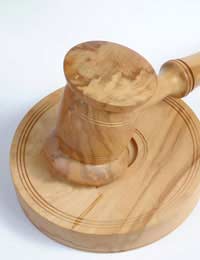The Role of a Auction House

The auction house has been central to auctions for centuries (Sotheby’s held its first auction in 1744 for example), and these days you can find auction houses that not only conduct general auctions, but specialise in everything from wine to houses, and everywhere in between.
The Role Of The Auction House
The auction house essentially takes care of everything, bringing together buyer and seller, arranging the viewing and the auction itself, as well as the collection of funds from the buyer and dispersal of money to the seller. Think of it as the hub of a wheel, with the buyers and sellers as the spokes.It makes money by charging the sellers a commission on the items sold, usually a percentage of the sales price, and sometimes also by charging a listing fee, which is often payable whether the items sells or not. With enough items and enough auctions, an auction house can become wealthy. Perhaps more important, however, is its reputation as a place selling quality items. Although the big auction houses, such as Christie’s and Sotheby’s, are international these days, you’ll find many regional houses with superb reputations all over the United Kingdom.
How The Auction House Works
If you have an item you wish to sell through an auction house, and they accept it, it might first be shown in the auction catalogue (these are generally just for high-ticket items), or be made available for viewing along with all the other lots, the day before the auction. You’ll have signed a contract, agreeing to pay the auction house a percentage of the selling price, and you’ll have had the option of putting a reserve on the item – a price under which you’re not obliged to sell.The auction will be conducted by the auctioneer, an employee of the house. Forget the American stereotype of the fast-talking auctioneer; these are generally very well trained people, usually experts in a specific field, and they speak slowly – how else can you keep track of bids, after all? Once the sale is complete, you’ll receive a cheque from the auction house for the price of the sale minus their commission.
Why Use An Auction House?
If you have a valuable item – a good antique or a work of art, for example – an auction house can connect you with knowledgeable buyers who’ll generally pay a good price for what you have to sell. The reputation of the house alone draws people to its auctions. So your potential for a good return on your item increases.Additionally, since they handle the money, the chances of you being scammed in any way are greatly reduced. Yes, you pay to have an auction house handle your goods, but in return, you have nothing to do except see they’re delivered before the auction takes place.For buyers, there are rewards, too. You know you’re bidding on items of quality (as a general rule), and in the case of expensive goods, often with a strong provenance. The auction is conducted in an impartial manner, and you’ll have ample chance to inspect the goods beforehand.
- Five Things to Beware of With TV Auctions
- How to Organise Your Own Charity Auction
- Dos and Don'ts for Charity Auctions
- TV Auction Channels: How Do They Work?
- How Charity Auctions Work?
- How to Research a Property Properly
- Unusual Property Auctions
- The Role of an Auctioneer
- The History of Auctions
- Police and Government Recovered Property Auctions
- How Do Reverse Auctions Work?
- Wine Auctions
- Buying a Car at An Auction
- Collectible Auctions
- How to Buy Art at Auction
- Auction Terminology
- How to Buy Commercial Property at Auction
- Buying a Residential Property at Auction
- In-Person Auctions and Auction By Proxy
- How to Use Online Auctions


Re: Problem With an Item Bought at Auction
Acquired a Russian Submarine clock from South Cheshire Autions when the package arrived I was having treatment when I…
Re: How to Set a Reserve Price in an Auction
I set a reserve price of £400 on my TGA Mobility Scooter - having researched online prices which showed my model…
Re: Beware of the Invisible Bidder
House on at auction online. Bidders must register - providing ID and contact details. I've registered had survey etc and am…
Re: Choosing Which Type of Auction to Sell At
Hello Explore Auctions, I would like you to evaluate my Silver item and send me a report about the item…
Re: Consumer Law and Auction Goods
I purchased a three-bedroom house from an Auction house when I had paid the money and then I received an email from the auction…
Re: How to Pay For Goods at Auction
A good blog always comes up with new and exciting information and while reading I felt that this blog has all those qualities…
Re: How to Avoid Forgeries, Fakes and Fraud at Auction
I won a few lots at auctionette They specified a slightly broken gilding at top of an edwardian mirror…
Re: Beware of the Invisible Bidder
One of the best posts I have ever come across. Not only did I learn a lot of hidden things, but I also got to know so many new…
Re: Problem With an Item Bought at Auction
Bought a beswick horse from The Action House on line timed auction.Got condition report first.All good.They offered…
Re: Consumer Law and Auction Goods
I had registered with easy live auction to bid for a watch I was successful in winning the item I duly paid the full amount by…